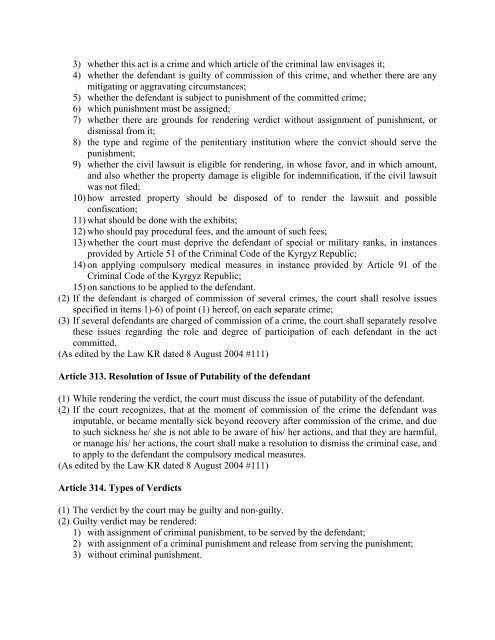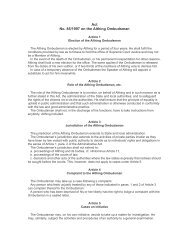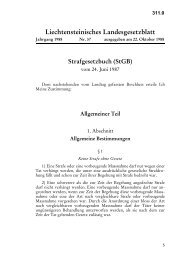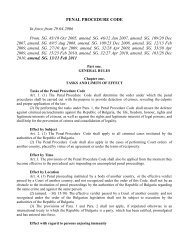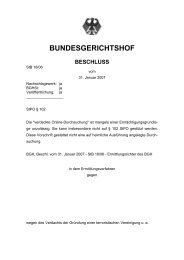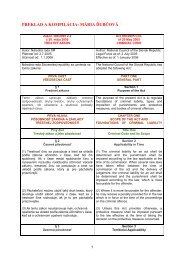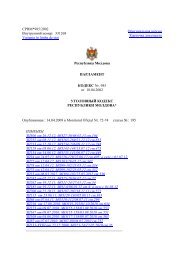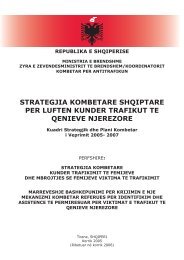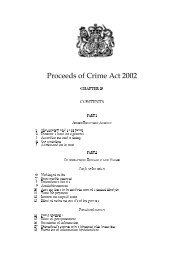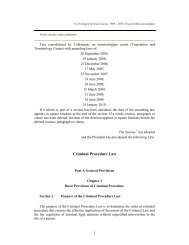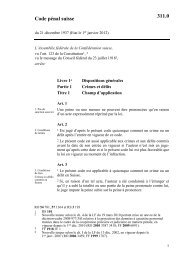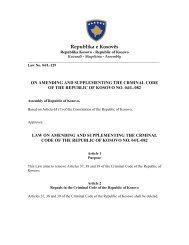Criminal Procedure Code of the Kyrgyz Republic - Legislationline
Criminal Procedure Code of the Kyrgyz Republic - Legislationline
Criminal Procedure Code of the Kyrgyz Republic - Legislationline
Create successful ePaper yourself
Turn your PDF publications into a flip-book with our unique Google optimized e-Paper software.
3) whe<strong>the</strong>r this act is a crime and which article <strong>of</strong> <strong>the</strong> criminal law envisages it;<br />
4) whe<strong>the</strong>r <strong>the</strong> defendant is guilty <strong>of</strong> commission <strong>of</strong> this crime, and whe<strong>the</strong>r <strong>the</strong>re are any<br />
mitigating or aggravating circumstances;<br />
5) whe<strong>the</strong>r <strong>the</strong> defendant is subject to punishment <strong>of</strong> <strong>the</strong> committed crime;<br />
6) which punishment must be assigned;<br />
7) whe<strong>the</strong>r <strong>the</strong>re are grounds for rendering verdict without assignment <strong>of</strong> punishment, or<br />
dismissal from it;<br />
8) <strong>the</strong> type and regime <strong>of</strong> <strong>the</strong> penitentiary institution where <strong>the</strong> convict should serve <strong>the</strong><br />
punishment;<br />
9) whe<strong>the</strong>r <strong>the</strong> civil lawsuit is eligible for rendering, in whose favor, and in which amount,<br />
and also whe<strong>the</strong>r <strong>the</strong> property damage is eligible for indemnification, if <strong>the</strong> civil lawsuit<br />
was not filed;<br />
10) how arrested property should be disposed <strong>of</strong> to render <strong>the</strong> lawsuit and possible<br />
confiscation;<br />
11) what should be done with <strong>the</strong> exhibits;<br />
12) who should pay procedural fees, and <strong>the</strong> amount <strong>of</strong> such fees;<br />
13) whe<strong>the</strong>r <strong>the</strong> court must deprive <strong>the</strong> defendant <strong>of</strong> special or military ranks, in instances<br />
provided by Article 51 <strong>of</strong> <strong>the</strong> <strong>Criminal</strong> <strong>Code</strong> <strong>of</strong> <strong>the</strong> <strong>Kyrgyz</strong> <strong>Republic</strong>;<br />
14) on applying compulsory medical measures in instance provided by Article 91 <strong>of</strong> <strong>the</strong><br />
<strong>Criminal</strong> <strong>Code</strong> <strong>of</strong> <strong>the</strong> <strong>Kyrgyz</strong> <strong>Republic</strong>;<br />
15) on sanctions to be applied to <strong>the</strong> defendant.<br />
(2) If <strong>the</strong> defendant is charged <strong>of</strong> commission <strong>of</strong> several crimes, <strong>the</strong> court shall resolve issues<br />
specified in items 1)-6) <strong>of</strong> point (1) here<strong>of</strong>, on each separate crime;<br />
(3) If several defendants are charged <strong>of</strong> commission <strong>of</strong> a crime, <strong>the</strong> court shall separately resolve<br />
<strong>the</strong>se issues regarding <strong>the</strong> role and degree <strong>of</strong> participation <strong>of</strong> each defendant in <strong>the</strong> act<br />
committed.<br />
(As edited by <strong>the</strong> Law KR dated 8 August 2004 #111)<br />
Article 313. Resolution <strong>of</strong> Issue <strong>of</strong> Putability <strong>of</strong> <strong>the</strong> defendant<br />
(1) While rendering <strong>the</strong> verdict, <strong>the</strong> court must discuss <strong>the</strong> issue <strong>of</strong> putability <strong>of</strong> <strong>the</strong> defendant.<br />
(2) If <strong>the</strong> court recognizes, that at <strong>the</strong> moment <strong>of</strong> commission <strong>of</strong> <strong>the</strong> crime <strong>the</strong> defendant was<br />
imputable, or became mentally sick beyond recovery after commission <strong>of</strong> <strong>the</strong> crime, and due<br />
to such sickness he/ she is not able to be aware <strong>of</strong> his/ her actions, and that <strong>the</strong>y are harmful,<br />
or manage his/ her actions, <strong>the</strong> court shall make a resolution to dismiss <strong>the</strong> criminal case, and<br />
to apply to <strong>the</strong> defendant <strong>the</strong> compulsory medical measures.<br />
(As edited by <strong>the</strong> Law KR dated 8 August 2004 #111)<br />
Article 314. Types <strong>of</strong> Verdicts<br />
(1) The verdict by <strong>the</strong> court may be guilty and non-guilty.<br />
(2) Guilty verdict may be rendered:<br />
1) with assignment <strong>of</strong> criminal punishment, to be served by <strong>the</strong> defendant;<br />
2) with assignment <strong>of</strong> a criminal punishment and release from serving <strong>the</strong> punishment;<br />
3) without criminal punishment.


